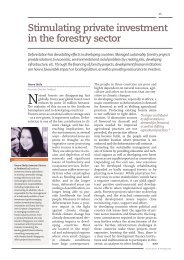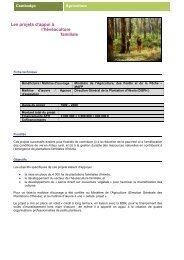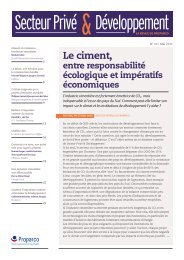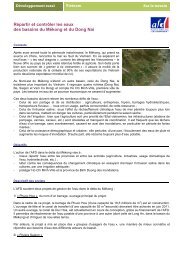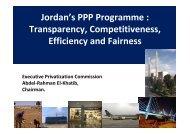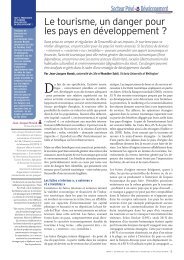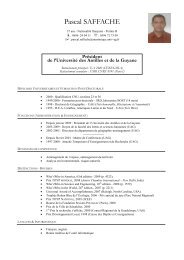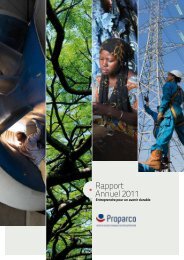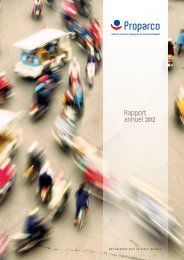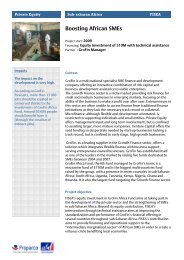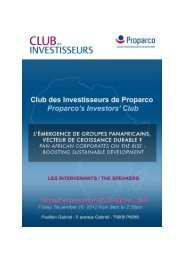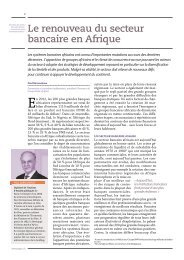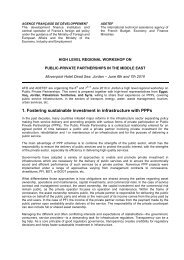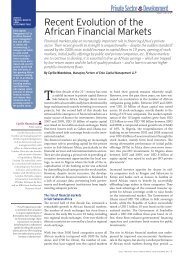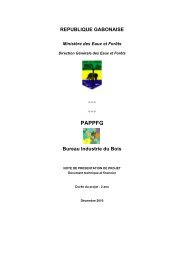Integrating Poor Populations in South African Cities - Agence ...
Integrating Poor Populations in South African Cities - Agence ...
Integrating Poor Populations in South African Cities - Agence ...
Create successful ePaper yourself
Turn your PDF publications into a flip-book with our unique Google optimized e-Paper software.
3. Urban Development Policies <strong>in</strong> a Unique Political and Institutional Context<br />
sentence for high treason along with other leaders of the opposition, was freed. He took<br />
over as head of the ANC, which was recognized as the primordial political actor <strong>in</strong> the<br />
struggle aga<strong>in</strong>st apartheid and the defence of non-white populations.<br />
Predom<strong>in</strong>ance <strong>in</strong> Post-Apartheid Political Life<br />
In April 1994, the first multi-racial elections were held, and the ANC won these<br />
elections with 62.6% of votes. Nelson Mandela then became the president of <strong>South</strong><br />
Africa. National elections are held every five years and, <strong>in</strong> 1999, the ANC won 66.4%<br />
of votes, which brought the former vice-president, Thabo Mbeki, to power. F<strong>in</strong>ally,<br />
dur<strong>in</strong>g the national elections <strong>in</strong> 2004, the ANC received 69.7% of votes and Thabo Mbeki<br />
began his second term of office. The 2009 elections gave the ANC another victory, and<br />
Jacob Zuma became president.<br />
3.1.2. The Other Political Parties<br />
62<br />
The Democratic Alliance (DA) is the primary opposition party, followed closely by<br />
the Inkhata Freedom Party (IFP). The DA, a mostly white party, was created <strong>in</strong> 2000 from<br />
a political merger and is currently led by Helen Zille, who is also mayor of Cape Town.<br />
The IFP is a ma<strong>in</strong>ly Zulu party born <strong>in</strong> 1975 <strong>in</strong> Natal Prov<strong>in</strong>ce <strong>in</strong> reaction to apartheid.<br />
The IFP and the ANC progressively began to clash, and the apartheid government<br />
sought to ma<strong>in</strong>ta<strong>in</strong> this political, even ethnic, rivalry. Today, the IFP accounts for only<br />
6% to 7% of votes <strong>in</strong> national elections.<br />
Nationally and <strong>in</strong> the prov<strong>in</strong>ces, the ANC completely dom<strong>in</strong>ates the political stage.<br />
It is on the municipal level that the opposition parties, and more specifically the DA, play<br />
a significant role. The DA won back power <strong>in</strong> the city of Cape Town dur<strong>in</strong>g the last<br />
municipal elections <strong>in</strong> March 2006, after hav<strong>in</strong>g lost <strong>in</strong> 2002, <strong>in</strong> large part thanks to<br />
coloured voters <strong>in</strong> the townships. Several other smaller (rather work<strong>in</strong>g-class)<br />
municipalities have elected political representatives that do not belong to the ANC. This<br />
is a sort of question<strong>in</strong>g of the ANC’s local management and a criticism of still not very<br />
effective local governments. One should note that, for historical and other reasons, the<br />
public adm<strong>in</strong>istration <strong>in</strong> <strong>South</strong> Africa is extremely politicized, and political considerations<br />
play a huge role <strong>in</strong> determ<strong>in</strong><strong>in</strong>g which programmes are developed at all levels of<br />
government.<br />
<strong>Integrat<strong>in</strong>g</strong> <strong>Poor</strong> <strong>Populations</strong> <strong>in</strong> <strong>South</strong> <strong>African</strong> <strong>Cities</strong> © AFD 2009



